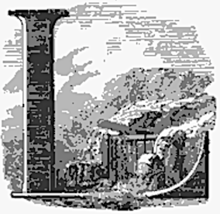Letitia Elizabeth Landon (L. E. L.) in Fisher's Drawing Room Scrap Book, 1837/Carthage
38

RUINS AT CARTHAGE.
|
CARTHAGE.
"Early on the morning following, I walked to the site of the great Carthage,—of that town, at the sound of whose name mighty Rome herself had so often trembled,—of Carthage, the mistress of powerful and brave armies, of numerous fleets, and of the world’s commerce, and to whom Africa, Spain, Sardinia, Corsica, Sicily, and Italy herself bowed in submission as to their sovereign—in short,—"Carthage, dives opum, studiisque asperrima belli :" I was prepared to see but few vestiges of its former grandeur, it had so often suffered from the devastating effects of war, that I knew many could not exist; but my heart sunk within me when ascending one of its hills, (from whose summit the eye embraces a view of the whole surrounding country to the edge of the sea.) I beheld nothing more than a few scattered and shapeless masses of masonry. The scene that once was animated by the presence of nearly a million of warlike inhabitants is now buried in the silence of the grave; no living soul appearing, if we occasionally except a soldier going or returning from the fort, or the solitary and motionless figure of an Arab, watching his flocks from the summit of the fragment of some former palace or temple."—Sir G. Temple’s Excursions in the Mediterranean.
 ow it lieth—earth to earth—
ow it lieth—earth to earth—
And to which that earth gave birth—
Palace, market-street, and fane;
Dust that never asks in vain,
Hath reclaimed its own again.
Dust, the wide world’s king.
Where are now the glorious hours
Of a nation’s gathered powers?
Like the setting of a star,
In the fathomless afar;
Time’s eternal wing
Hath around those ruins cast
The dark presence of the past.
Mind, what art thou? dost thou not
Hold the vast earth for thy lot?
In thy toil, how glorious!
What dost thou achieve for us,
Over all victorious!
God-like thou dost seem.
But the perishing still lurks
In thy most immortal works;
Thou dost build thy home on sand,
And the palace-girdled strand
Fadeth like a dream.
Thy great victories only show
All is nothingness below.
"The small dome in the centre belongs to the lesser set of cisterns; on the left are the ruins of a palace or church; and on the extreme left the remains of an ancient edifice, on which now stands Burj Sidi Boo-Saeed, or Fort St. Louis. To the right is seen part of the ancient Cothon, Halek el Wad, the lake of Tunis and the bay; and beyond these the Hammam ’l Enf, and the Boo-kurneen; and in the distance the Jabel Zaghwan."— Sir G. Temple’s Journal.